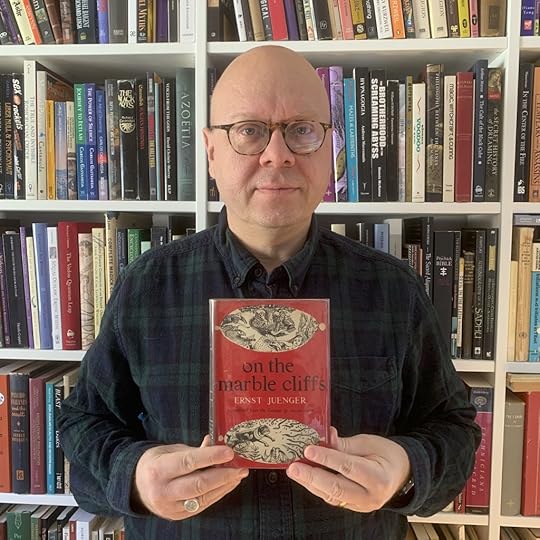Why not read another book?

I recently succumbed to one of those Facebook peer pressure things, and listed ten of my favourite books for ten consecutive days. You might enjoy them too, if you haven’t already come across them. No real order of preference here, just ten highly recommended books/authors.
1. Gore Vidal: “Kalki” – There are many reasons to appreciate Gore Vidal: his ambitious historical novels, his witty essays on (and criticism of) American politics and culture, and the absurdist novels of the late 1960s and 70s. I love them all, but his trippy novels have been more defining of my fiction writing in English than anything (or anyone) else. “Kalki” is especially great, and was a defining influence (a pretty obvious one) in and on my first novel “Mother, Have A Safe Trip.”
2. Ernst Jünger: “On the Marble Cliffs” – There are only a few books that I return to, over and over. Jünger’s literally fantastic tale of independence, morality and sense of humanity during times of authoritarian conflict is one of these books. It’s part “magical realism,” it’s part poetic fairy tale, and it’s also a very intelligent critique of the inherent brutality of all collectivist systems. Stylishly suave, penetratingly potent, and charged with an indescribable glamor that only true classics can pull off.
3. Ray Bradbury: “The October Country” – This volume is an early collection, with many of the stories stemming from the first ever Bradbury anthology: “Dark Carnival.” The overall “oeuvre” of Bradbury is staggering, and has been influential beyond belief when it comes to post WW2 American literature (as well as to myself). Stripped but never soulless, metaphorical but never pretentious; a master of condensation and engaging flights of fancy. The reason why I chose this book and not pretty obvious novels like “Something Wicked This Way Comes” or “Fahrenheit 451” is that the short story format is currently knocking on my own door… Knock, knock, who’s there?
4. Mikhail Bulgakov: “The Master and Margarita” – I have just finished writing a new novel called “The Devil’s Footprint,” in which Satan sets out to clean up the current human mess. While writing it, my mind often drifted towards Bulgakovian twists and turns. The integration of supernatural symbols and forces in an already absurd consensus reality is usually great fodder for fiction. But it takes sensitivity and, of course, a genuine sense of humour to be able to convey it all to a discerning readership. This 1938 mega classic is such a masterpiece, and transcends any specifically “Russian” (or, in Bulgakov’s case, “Soviet”) absurdist traditions; growing ever since then into a Sui Generis expression of sublime intelligence.
5. Italo Calvino: “If On A Winter’s Night A Traveller” – What happens when the book you’ve just bought mistakenly contains sections from another book? And you take it back to the store only to get another seemingly faulty book? And you then decide to investigate what’s going on because it never seems to end? While at the same time there’s a parallel narrative in and from all these different satellite books we come across during our reading, and the protagonists’ searching? Yes, a mind-bending maze indeed! Calvino is a most gleeful god in the pantheon of modern literature; a brainiac love child stemming from a feverish tryst between the minds of fellow gods Umberto Eco and Jorge Luis Borges.
6. Paul Bowles: “Call At Corazon” – A great anthology of superior Bowles short stories from between 1946 and 1985. The title story is one of my favourite short stories ever; summing up not only psychologically complex insights regarding the underlying sadomasochism of basically any relationship, but also some truly exquisite expressions of Bowles’s detached prose (as well as attitude). Paul Bowles wove his expat magic masterfully wherever he placed his typewriter, and this anthology is an invitation to go a-trippin’ with this enormously influential writer.
7. Hermann Hesse: “Pictor’s Metamorphoses and other stories” – Hard to pinpoint one work here, as we’re really talking about one highly influential author rather than one specific expression. This collection is quite wonderful though, as it really focusses on what makes Hesse such a master: the upheaval of the rational, expected, causal, petit bourgeois etc. Swinging between fairytales and allegorical psychological fables, Hesse fixes his gaze and his storytelling on what matters most of all: the timeless continuity of human endeavours, encapsulated in fanciful myths that inspire and strengthen these very endeavours – “the Salvation of the Poetic Principle through the ironic Metamorphosis of Mythos…” If we can’t elevate ourselves to be part of a mythic thinking and reasoning, we are mere soulless automata.
8. Haruki Murakami: “Hard-boiled Wonderland and the end of the world” – If you’ve followed this past week’s displays of influential books, you can probably see a pattern in my love for absurdist reinterpretations of the so called normal world. That said, there needs to be some Japanese weirdness in here too. There are many contenders (Akutagawa and Kawabata are among my faves) but let’s stick with a contemporary one: Murakami. His amazing novels (like the one displayed here) start out weird and then just snowball uphill with more bizarre Japanese antics and many a delightful pop cultural reference. A master in his own lifetime, and he still has a long way to go!
9. Yukio Mishima: “Thirst For Love” – Again, the inspiration for me lies more in the entire authorship than in this single book, but as such it is a fine and telling example. Sparse prose, elegant, polished surfaces, a detached observing of human frailty (and associated manipulations), and a gradual diving deeper into dark obsessions. The form is seductively normal but the content is a display of cruelty; emotional as well as sexual. That’s a pretty good summing up of Mishima as a person too: if the surface is correct, you can get away with a whole lot!
10. Jorge Luis Borges: “Collected Fictions” – Well, what can I say? Saving the best for last? Borges’s authorship is like the Holy Grail, and when you’ve truly found it, you’re immediately elevated – regardless if you’re a writer or just a reader. Borges offers several very important keys: keep forms accessible and then present the unexpected with conviction and determination. However, always with suave casual detachment. (As you have noticed or already knew, this attitude is present in all of the authors I’ve presented in this literary odyssey of inspiration and influence.) Being blind, Borges is ever the perfect Captain. All aboard his super tanker/thinker library ship, towards the horizon – the actual direction doesn’t really matter. Underneath the surface lie hidden creatures and obsessions; a little dip here and there will last us lifetimes of stories. Then we ambitiously write them all down, make books of them, and put them in the massive library hidden in the innards of the vessel; only to find that there are already infinite volumes containing the exact same stories on the shelves – all written by Borges, of course. We are mere mates on his big ship!
(Photograph by my fellow bookworm Vanessa Sinclair!)



